R.C. Sproul's Blog, page 489
February 28, 2013
40+ Years of Ministry — A Testimony of Grace (Video)
From 1971 to the present day, R.C. Sproul and Ligonier have experienced more than 40 years of ministry. In a short video timeline we trace this testimony of God's grace.
We especially want to say thank you to our Ministry Partners for their prayers and support.

Watch "Economics Has Consequences" for Free
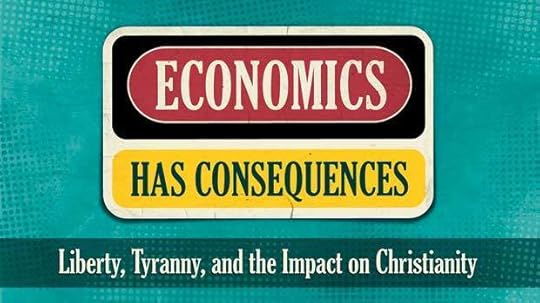
Last year we told you about R.C. Sproul Jr.'s 12-part teaching series and curriculum, Economics for Everybody. We are now pleased to announce the documentary, Economics Has Consequences, an abridged version of the original 12-part series.
In this uniquely entertaining exploration of economics, R.C. Sproul Jr. introduces basic principles of economics such as stewardship, civil government, work, wealth, and entrepreneurism. He then explores the impact of government intervention on education, the money supply, welfare, depressions, markets, and more. With each succeeding example, it becomes evident that economic freedom is directly related to religious freedom, and that the loss of one inevitably leads to the loss of the other.
"Where the original series is great for small groups, Sunday schools, and students, the abridged documentary is perfect for a single session at a church, an evening's entertainment for a family, or an individual wanting a quick intro to economics." —Compass Cinema
Watch it Free
Now until the end of March, we are streaming Economics Has Consequences on YouTube and Vimeo for free.
Own a Copy
Economics Has Consequences can be pre-ordered on DVD from the Ligonier Store. The full curriculum, Economics for Everybody, is also available.

February 27, 2013
Audio And Video Now Available — 2013 National Conference
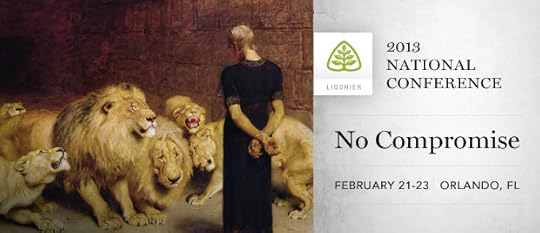
"We live in an age of compromise, but if we stand on the bedrock of God's truth, we will not bend with the winds of relativism and faithlessness." —R.C. Sproul
Last week we held our 2013 National Conference on the theme, No Compromise. This conference sought to encourage Christians to stand firm for bedrock truths such as the resurrection of Christ, the trustworthiness of Scripture, the importance of theology, the primacy of preaching, the exclusivity of Jesus, and other subjects of scriptural study.
We are now pleased to announce that the audio and video from each session are available either to purchase or stream for free:
The Article on Which the Church Stands or Falls by R.C. Sproul
Feet Firmly Planted in Midair by Steven Lawson
Questions & Answers with Begg, Carter, Lawson, Sproul, and Sproul Jr.
Preach the Word by Alistair Begg
Here I Stand by Steven Lawson
Family Tradition by Cal Thomas
Doctrine in the Dock by Sinclair Ferguson
Have Mercy by Alistair Begg
A Good Offense by R.C. Sproul Jr.
He Is Risen Indeed by Ravi Zacharias
On This Rock by Sinclair Ferguson
Questions & Answers with Ferguson, Lawson, Sproul and Thomas
No Compromise, No Surrender by R.C. Sproul
Optional Sessions:
A Puritan Theology by Joel Beeke and Mark Jones
Blood Work by Anthony Carter
The Heroic Boldness of Martin Luther by Steven Lawson
Christians Get Depressed Too by David Murray
Economics for Everybody by R.C. Sproul Jr.
We hope to see many of you at our other events this year, including our British Reformation Study Tours and our Fall Conference at Reformation Bible College (September 27-28, 2013). In 2014 our National Conference will be March 13-15. Save those dates and stay tuned for more details.

Martin Luther: 7000 Sermons

In the tempestuous days of the Reformation, the centerpiece of Luther's ministry was his bold biblical preaching. Fred W. Meuser writes: "Martin Luther is famous as reformer, theologian, professor, translator, prodigious author, and polemicist. He is well known as hymn-writer, musician, friend of students, mentor of pastors, and pastor to countless clergy and laity. Yet he saw himself first of all as a preacher." Luther gave himself tirelessly to this priority. E. Theodore Bachmann adds, "The church . . . is for Luther 'not a pen-house, but a mouth-house,' in which the living Word is proclaimed." Indeed, Luther wrote voluminously, yet he never put his written works on the same level with his proclamation of God's Word. He maintained, "Christ Himself wrote nothing, nor did He give command to write, but to preach orally." By this stance, Luther strongly underscored the primacy of the pulpit.
Christ Himself wrote nothing, nor did He give command to write, but to preach orally. —Martin Luther
Luther's commitment to the pulpit can be clearly seen in his preaching activities. On most Sundays, he preached two or three times, and, by his own admission, "Often I preached four sermons on one day." In addition, he usually preached at least two to three times during the week, sometimes more. On religious holidays, he preached twice a day. His relentless drive in this work is seen in the staggering number of sermons he preached—seven thousand between 1510 and 1546. That is almost two hundred sermons per year, or four per week. Throughout his ministry, Luther preached, on average, one sermon every two days. Some twenty-three hundred of these biblical expositions survive in written form.
Throughout his ministry, Luther preached, on average, one sermon every two days. —@DrStevenJLawson
Whenever Luther traveled away from his home in Wittenberg, he was asked to preach, and he complied even to the point of exhaustion. Moreover, he constantly preached to students in his home. Even in 1528, a year marked by the Black Plague, Luther preached some two hundred sermons. He claimed to have equaled the activity of an army of preachers: "No longer am I only Luther, but Pomeranus, too, an official, a Moses, a Jethro and what not? All things to all men." This is to say, in his preaching, he did the work of a host of men.
This post is an excerpt from Steven Lawson's new book, The Heroic Boldness of Martin Luther.

The Heroic Boldness of Martin Luther, New from Steven Lawson and Reformation Trust
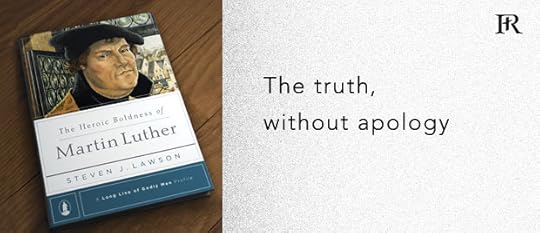
During the Protestant Reformation of the sixteenth century, the Reformers' most effective tool was the pulpit, and all of the Reformers were gifted preachers. This was especially true of Martin Luther, the man regarded as the father of the Reformation.
Luther used every legitimate means to make known the truths of Scripture. His strategies included writing books, tracts, pamphlets, and letters, as well as classroom lectures, public debates, and heated disputations in churches and universities. But his chief means of producing reform was the pulpit, where he proclaimed the truths of God's Word with great courage. In a day when the church greatly needed to hear the truth, Luther's pulpit became one of the most clarion sounding boards for God's Word this world has ever witnessed.
In The Heroic Boldness of Martin Luther, Dr. Steven J. Lawson shows the convictions and practices that fed Luther's pulpit boldness, providing an example for all preachers in a day when truth once more is in decline.
Buy The Heroic Boldness of Martin Luther for $16.00 $12.80 from ReformationTrust.com.
Endorsements
"In The Heroic Boldness of Martin Luther, I found a Luther of whom little is told: a Luther who loved an inerrant Scripture, a Luther who preached a glorious gospel, a Luther who was passionate for God's glory and God's people, a Luther who was willing to suffer for the cause. I am convinced that Steve Lawson has come closer to capturing the heart of Luther's passions and desires as a gospel minister than anyone else. Here I found encouragement for my heart as I carry out my weekly ministry: read this and find encouragement for yours."
—Dr. Sean Michael Lucas
Senior minister, First Presbyterian Church, Hattiesburg, Mississippi
"With the quincentenary of the Reformation just around the corner, the publication of Steven Lawson's The Heroic Boldness of Martin Luther could not be more timely. Indeed, with the modern church very much in need of the very kind of preaching Dr. Lawson portrays here, this book's message is perhaps more vital than at almost any time since the days of Luther. Highly recommended."
—Dr. George Grant
Pastor, Parish Presbyterian Church, Franklin, Tennessee
"Here is a profile of Luther the preacher in all his red-blooded roughness and desperate, dogged faithfulness. Steven Lawson has captured the spirit of this volcanic Reformer superbly, and the result is deeply stirring. This is a most welcome book for today, when the church is in such desperate need of reformation. May it help to rouse a generation of Luthers."
—Dr. Michael Reeves
Head of theology, Universities and Colleges Christian Fellowship, UK
Google Hangout
Last month we did a Google Hangout with Steven Lawson to discuss this book.
Buy The Heroic Boldness of Martin Luther for $16.00 $12.80 from ReformationTrust.com.

February 26, 2013
Dealing with Lust
Here's an excerpt from Dealing with Lust, Joseph Pipa Jr.'s contribution to the February issue of Tabletalk.
"They are as close as our skin, the troika of lusts described by the Apostle John: the lust of the flesh, the lust of the eyes, and the boastful pride of life (1 John 2:16). These inordinate and forbidden longings of the sinner are the fountain of sin, as James points out when teaching that God does not tempt us to sin: "But each one is tempted when he is carried away and enticed by his own lust. Then when lust has conceived, it gives birth to sin; and when sin is accomplished, it brings forth death" (James 1:14–15 NASB).
The natural man is in bondage to his lusts (Rom. 3:10–18), but at our conversion, because of our union with Christ, we are delivered from the dominion of lusts: "Therefore do not let sin reign in your mortal body so that you obey its lusts, and do not go on presenting the members of your body to sin as instruments of unrighteousness; but present yourselves to God as those alive from the dead, and your members as instruments of righteousness to God. For sin shall not be master over you, for you are not under law but under grace" (6:12–14)."
Continue reading Dealing with Lust or begin receiving Tabletalk magazine by signing up for a free 3 month trial.

February 25, 2013
The Cost of Compromise

Martin Luther wasn't prone to compromise. He famously said in his sermon "Knowledge of God's Will and Its Fruit":
The world at the present time is sagaciously discussing how to quell the controversy and strife over doctrine and faith, and how to effect a compromise between the Church and the Papacy. Let the learned, the wise, it is said, bishops, emperor and princes, arbitrate. Each side can easily yield something, and it is better to concede some things which can be construed according to individual interpretation, than that so much persecution, bloodshed, war, and terrible, endless dissension and destruction be permitted.
Here is lack of understanding, for understanding proves by the Word that such patchwork is not according to God's will, but that doctrine, faith and worship must be preserved pure and unadulterated; there must be no mingling with human nonsense, human opinions or wisdom.
The Scriptures give us this rule: "We must obey God rather than men" (Acts 5:29).
It is interesting to speculate what the church would be like today if Luther had compromised. The pressure was heavy on him to tone down his teaching, soften his message, and stop poking his finger in the eye of the papacy. Even many of his friends and supporters urged Luther to come to terms with Rome for the sake of harmony in the church. Luther himself prayed earnestly that the effect of his teaching would not be divisive.
Compromised truth has no hope of rescuing the eternal souls of men and women... —@JohnMacArthur
When he nailed his Ninety-five Theses to the door, the last thing he wanted to do was split the church.
Yet sometimes division is fitting, even healthy, for the church. Especially in times like Luther's— and like ours—when the visible church seems full of counterfeit Christians, it is right for the true people of God to declare themselves and defend the truth. Compromise is sometimes a worse evil than division. Second Corinthians 6:14-17 isn't speaking only of marriage when it says:
Do not be bound together with unbelievers; for what partnership have righteousness and lawlessness, or what fellowship has light with darkness? Or what harmony has Christ with Satan, or what has a believer in common with an unbeliever? Or what agreement has the temple of God with idols? For we are the temple of the living God; just as God said, "I will dwell in them and walk among them; and I will be their God, and they shall be My people. Therefore, come out from their midst and be separate," says the Lord.
Sadly, this familiar command to separate is frequently both misunderstood and violated. But Paul is not giving believers license for legalism, sectarianism, or monasticism.
Instead, he's drawing on an analogy from the Mosaic law. In Deuteronomy 22:10, the Lord commanded the Israelites, "You shall not plow with an ox and a donkey together." Those two animals do not have the same nature, gait, or strength. Therefore it would be impossible for such a mismatched pair to plow together effectively. They would be unequally yoked.
Paul's meaning is clear: believers and unbelievers are two very different creatures and cannot work together in the spiritual realm. He called for separation in matters of the work of God, since such cooperation for spiritual benefit is impossible.
We sometimes tend to think of the early church as pristine, pure, and untroubled by serious error. The truth is, it wasn't that way at all.
From the very beginning, the enemies of truth launched an effort to infiltrate and confuse the people of God by mangling the truth and by blending lies with Christian doctrine. Attacks against the truth regularly came not only from persecutors on the outside but also from false teachers and professing believers within the visible community of the church.
That was the case in the Corinthian church, where false teachers brought with them a quasi-Christian syncretism of gospel truth, Jewish legalism, and pagan mysticism. They were eager to blend the people of God with the pagan worshipers, and the truth of Scripture with the lies of Satan.
That kind of spiritual blending is exactly what Jude warns against in the third verse of his short epistle. "Beloved, while I was making every effort to write you about our common salvation, I felt the necessity to write to you appealing that you contend earnestly for the faith which was once for all handed down to the saints." Through the pen of Jude, the Holy Spirit urges us to exercise caution, discernment, courage, and the will to contend for the truth.
Notice what we are supposed to be fi ghting for. It is not anything petty, personal, mundane, or ego related. It's not mere wrangling between competing ideologies. It's not a campaign to refine someone's religious creed or win denominational bragging rights. It's not a battle of wits, or a game of any kind.
What we are called to defend is no less than "the faith which was once for all handed down to the saints." He's talking about a serious struggle to safeguard the heart and soul of the truth itself and unleash that truth against the powers of darkness. Compromised truth has no hope of rescuing the eternal souls of men and women who have been unwittingly ensnared by the trap of devilish deception.
This is a battle we cannot wage effectively if we always try to come across to the world as merely nice, nonchalant, docile, agreeable, fun-loving people. We must not take our cues from others who are perfectly happy to compromise the truth whenever possible for "harmony's" sake. Friendly dialog may sound affable and pleasant. But neither Christ nor the apostles ever confronted serious, soul-destroying error by building collegial relationships with false teachers. In fact, we are expressly forbidden to do that (Romans 16:17, 2 Thessalonians 3:6, 2 Timothy 3:5, 2 John 10-11).
The appearance of unity, no matter how enticing, is not worth sacrificing the clarity of the gospel. —@JohnMacArthur
Infiltrating churches under the guise of tolerance and cooperation is one of Satan's most cunning ploys. He does not want to fight the church as much as join it. Undiscerning believers who partner in a common spiritual cause with unbiblical forms of Christianity or other false religions open the door wide to satanic corruption. The appearance of unity, no matter how enticing, is not worth sacrificing the clarity of the gospel.
Furthermore, embracing those heretical systems falsely reassures their followers that all is well between them and God, when actually they are headed for eternal damnation. Partnering in a spiritual enterprise with unbelievers helps Satan muddy the doctrinal waters, and it cripples our ability to preach the need for repentance.
Scripture is clear about how we are to respond when the very foundations of the Christian faith are under attack: our duty is to contend, not compromise.

February 24, 2013
Twitter Highlights — 2013 National Conference
Here are several Twitter highlights from our 2013 National Conference.
Believing the doctrine is not enough to save you, but attacking the doctrine is enough to damn you —RC on justification by faith alone #lmnc
— Ligonier Ministries (@Ligonier) February 21, 2013
If the history of redemption is a story told in pictures, then the blood of Jesus is the paint... —Anthony Carter #lmnc
— Ligonier Ministries (@Ligonier) February 22, 2013
We do not read the Gospels to answer the Q, "Who am I?" ... We read the Gospels to answer the Q, "Who is the Lord Jesus Christ?" #lmnc
— Ligonier Ministries (@Ligonier) February 22, 2013
I only need a mirror to see a sinner. —@alistairbegg #lmnc
— Ligonier Ministries (@Ligonier) February 22, 2013
To abandon the Bible is to abandon God. —@drstevenjlawson #lmnc
— Ligonier Ministries (@Ligonier) February 22, 2013
God can take the most useless and worthless things in our lives and form them into something useful and beautiful. —@davidpmurray #lmnc
— Ligonier Ministries (@Ligonier) February 22, 2013
God made everything, and therefore God owns everything. —@rcsprouljr #lmnc
— Ligonier Ministries (@Ligonier) February 23, 2013
We need to be churches prepared to die to this world and in this world... —Sinclair Ferguson #lmnc
— Ligonier Ministries (@Ligonier) February 23, 2013
The song of the martyrs, the song of the church is always the same: "Jesus Ho Kurios" (Jesus is Lord). —RC Sproul #lmnc
— Ligonier Ministries (@Ligonier) February 23, 2013
All messages from our 2013 National Conference will be available on Ligonier.org soon. Stay tuned for the announcement.

February 23, 2013
Day 3 — 2013 National Conference

Today was the conclusion of our 2013 National Conference, No Compromise: Standing for the Truth of God's Word. Over these three days, more than 5000 Christians came together and enjoyed fellowship, encouragement, prayer, worship, and the study of God's Word. Our prayer is that we would all leave this conference encouraged to stand on the bedrock of God's truth and not bend with the winds of relativism and faithlessness.
Below is a summary of today's sessions and several highlights.
Today's Sessions
On This Rock from Sinclair Ferguson
Our final day began with Sinclair Ferguson presenting us with the supreme priority of the church in the purposes of Christ. According to His own sovereign and gracious will, our Lord has determined to build His church in a hostile world through the service of frail men. The church stands at the epicenter of the purposes of the Lord Jesus, therefore we are to be like our Lord and love and build His church.
Questions and Answers with Sinclair Ferguson, Steven Lawson, R.C. Sproul, Cal Thomas
Today's questions ranged from addressing politics in the pulpit, revival, the call to ministry, tradition, assurance, and more.
No Compromise, No Surrender from R.C. Sproul
In conclusion to our 2013 National Conference, R.C. Sproul briefly surveyed the lives of several men who died a martyrs death as they stood firm for their confessions of Christ. There is a creed for which many like these died and for which we must never compromise—the song of the angels, the song of the martyrs, the song of the church: Jesus Ho Kurios (Jesus is Lord).
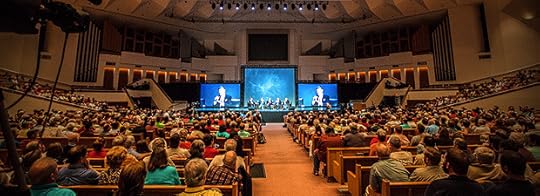
Tweetable Highlights
We need to be churches prepared to die to this world and in this world... —Sinclair Ferguson #lmnc
— Ligonier Ministries (@Ligonier) February 23, 2013
The song of the martyrs, the song of the church is always the same: "Jesus Ho Kurios" (Jesus is Lord). —RC Sproul #lmnc
— Ligonier Ministries (@Ligonier) February 23, 2013
You cannot be called to Jesus Christ without being called into fellowship with His people. —Sinclair Ferguson #lmnc
— Ligonier Ministries (@Ligonier) February 23, 2013
#lmnc comes to a close with the Hallelujah Chorus instagr.am/p/WFP1S6iasm/
— Ligonier Ministries (@Ligonier) February 23, 2013
Over 40 Years of Ministry
A Testimony of Grace
From 1971 to the present day, R.C. Sproul and Ligonier have experienced more than 40 years of ministry. In a short video timeline that we first showed yesterday at the conference, we traced this testimony of God's grace.
Save the Date
Preparations are already underway for our 2014 National Conference, March 13-15. We hope to see you all again next year in Orlando.
Note: Our conference messages will be on Ligonier.org next week to stream for free. Stay tuned for an announcement of when they're available.

Day 2 — 2013 National Conference
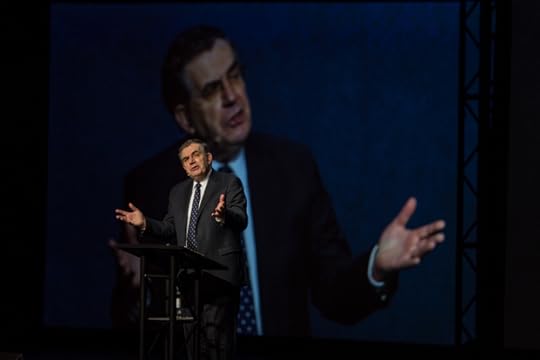
Today is day two of our 2013 National Conference, No Compromise: Standing for the Truth of God's Word. Christians began arriving as early as 7am this morning and at 10pm there were still Christians enjoying fellowship, discussing the Scriptures, and reading. Day two is the longest of the conference's three days, and below is a summary and several highlights.
Today's Sessions
Here I Stand from Steven Lawson
Steven Lawson explained why it is essential for the church to stand firm in their belief that the Scriptures are inspired, inerrant, and authoritative. We must be willing to defend its veracity. Here we stand. We can do no other.
Family Tradition from Cal Thomas
Cal Thomas explored the modern culture's attacks on the family and how their worldview has sadly infiltrated much of today's church. We must stand firm for family values in our post-Christian world.
Doctrine in the Dock from Sinclair Ferguson
Sinclair Ferguson refuted the idea that "doctrine divides while experience unites" and explained how doctrine is valuable and essential in the church. Doctrine transforms experience and helps us apply what we study to our lives.
Have Mercy from Alistair Begg
Despite the fact that Jesus associated with the sick, the sinful, and the socially outcast, many Christians have adopted an attitude similar to the Pharisees, who shunned those they deemed unworthy of compassion. Alistair Begg exhorted us to practice true mercy toward those outside the church and to be merciful to others just as our Heavenly Father has been merciful to us.
A Good Offense from R.C. Sproul Jr.
R.C. Sproul Jr. exhorted Christians to preach the foolishness of Christ crucified to this world and to stand boldly against modern evils such as abortion. The gospel is offensive and therefore we preach knowing that we will be hated for the sake of Christ.
He Is Risen Indeed from Ravi Zacharias
The last session of day two came as Ravi Zacharias expounded on the nature of resurrection life being inextricably linked to the miraculous nature of creation, the new birth, and redemption. Because of these truths, we through Jesus Christ, may have hope not only in this world, but also in the world to come.

Tweetable Highlights
Look, I've read other books... this book reads me. —@drstevenjlawson speaking on the Bible at #lmnc
— Ligonier Ministries (@Ligonier) February 22, 2013
The standard is not man's best efforts, but God's infinite holiness. —@calthomas #lmnc
— Ligonier Ministries (@Ligonier) February 22, 2013
The problem is not in the clarity of the revelation. The problem is in the darkness of the human mind. —Sinclair Ferguson #lmnc
— Ligonier Ministries (@Ligonier) February 22, 2013
I only need a mirror to see a sinner. —@alistairbegg #lmnc
— Ligonier Ministries (@Ligonier) February 22, 2013
God's own foolishness is stronger than men. Do we believe that? —@rcsprouljr #lmnc
— Ligonier Ministries (@Ligonier) February 22, 2013
Atheism is an exercise in intellectual contempt. —@ravizacharias #lmnc
— Ligonier Ministries (@Ligonier) February 23, 2013
Google Hangout
During our 2013 National Conference we're "Hanging Out" with several of our guests. On day two, we interviewed Steven J. Lawson and discussed several of today's messages, what to do if you're struggling with sin, Scripture and the unbeliever, Martin Luther, doctrine, theology, and more. You can watch it here or see it below.
Note: Our conference messages will be on Ligonier.org next week to stream for free. Stay tuned for an announcement of when they're available.

R.C. Sproul's Blog
- R.C. Sproul's profile
- 1933 followers



